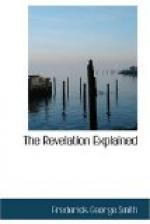10. The same shall drink of the wine of the wrath of God, which is poured out without mixture into the cup of his indignation; and he shall be tormented with fire and brimstone in the presence of the holy angels, and in the presence of the Lamb:
11. And the smoke of
their torment ascendeth up for ever and
ever: and they have no
rest day nor night, who worship the beast
and his image, and whosoever
receiveth the mark of his name.
12. Here is the patience
of the saints: here are they that keep
the commandments of God, and
the faith of Jesus.
13. And I heard a voice from heaven saying unto me, Write, Blessed are the dead which die in the Lord from henceforth: Yea, saith the Spirit, that they may rest from their labors; and their works do follow them.
Another phase of the last reformation is here brought to view—its communicative genius. It not only stands clear from the apostasy, but it sounds the warnings of God and proclaims his message. The first messenger had a very important message to deliver, even “the everlasting gospel.” His message was not limited to the inhabitants of “the earth”—the Apocalyptic earth—only, but included “every nation, and kindred, and tongue, and people,” showing that it was of universal importance. It was not a new gospel, but the everlasting gospel, the same gospel preached before the long period of apostasy. There is one phase different, however, and that is that the nearness of the second coming of Christ is a leading feature; the messenger with loud voice warns the people to prepare for the awful judgment just at hand by turning to “worship him that made heaven, and earth, and the sea, and the fountains of waters.” The apostle Paul cautioned the Thessalonian brethren not to entertain the idea that the advent of Christ was then near at hand, for it could not come until after the great period of apostasy that he predicted; but here is a messenger now claiming that the “hour of his judgment is come”—an event just at hand. He carries his special message to all people; for Jesus declared, “This gospel of the kingdom shall be preached in all the world for a witness unto all nations; and then shall the end come.” Matt. 24:14. This represents the restoration of gospel truth in the reformation that was begun about the year A.D. 1880 and that is now being carried to all nations by a holy ministry.
The nature of this restoration work is clearly shown. Its leading feature is its missionary character, the proclamation of the pure gospel to “every nation, and kindred, and tongue, and people.” Since the days of the apostles the whole gospel has not been boldly declared and carried forward with burning missionary zeal. Romanism and Protestantism have conducted their missionary work and, according to chap. 16:14, their sphere of influence will extend throughout “the whole world”; but here is clearly set forth the fact that God has authorized another universal message and world-wide work wholly distinguished from all others. The contrast between the worshipers of the beast and his image and those composing the redeemed company on Mount Sion is so clear, also the nature of the work done by each, that we can not possibly identify them as being one.




